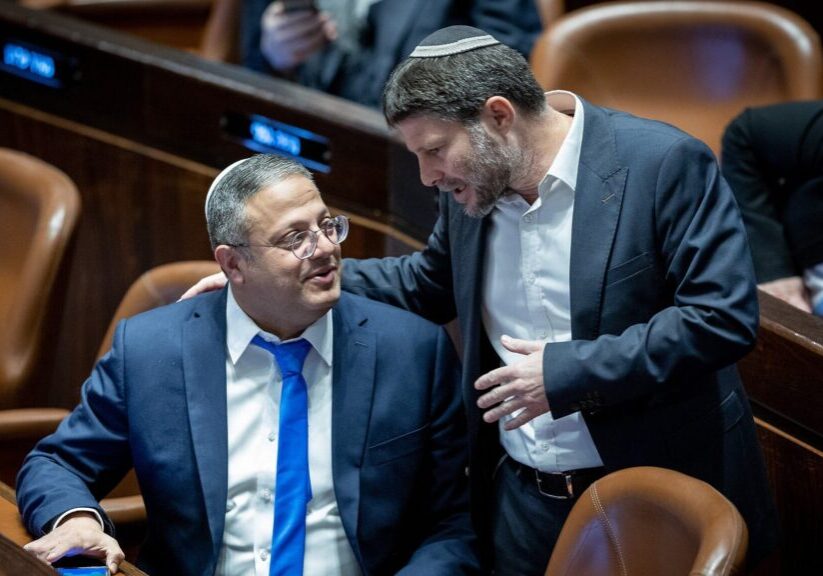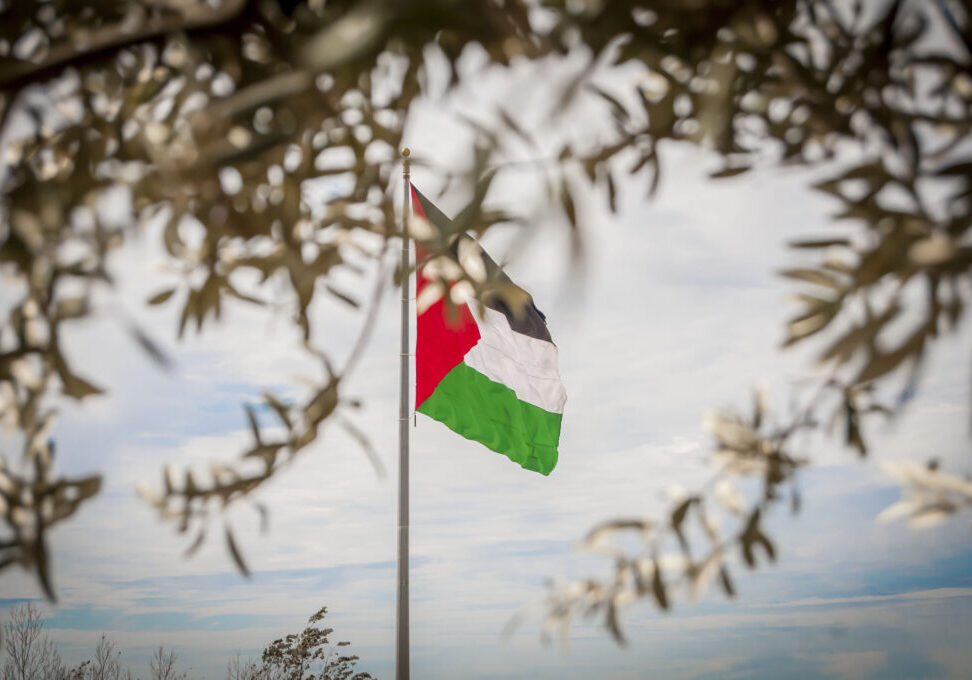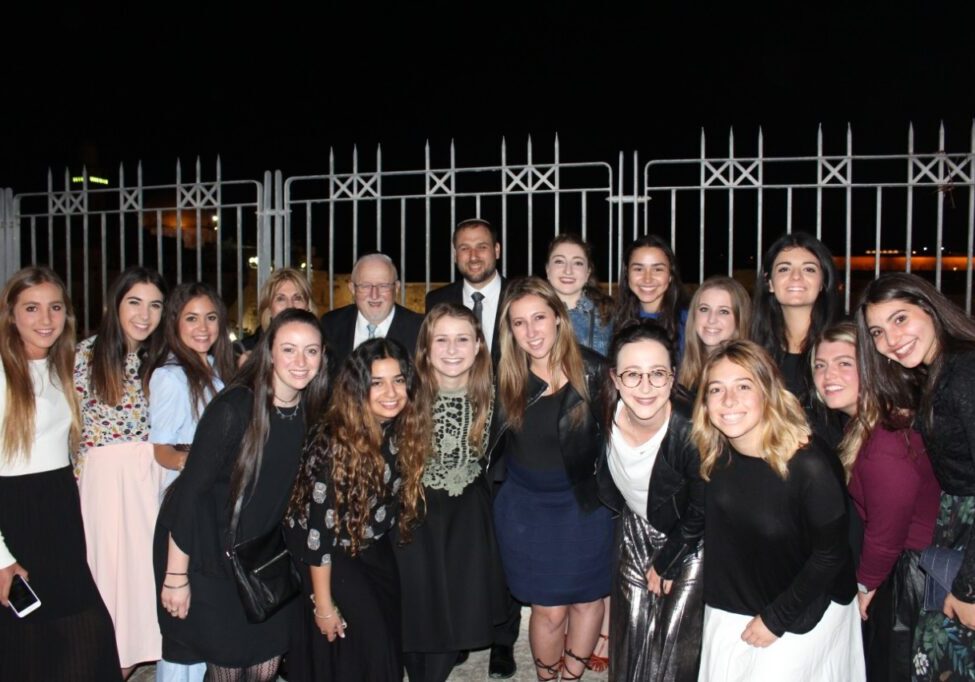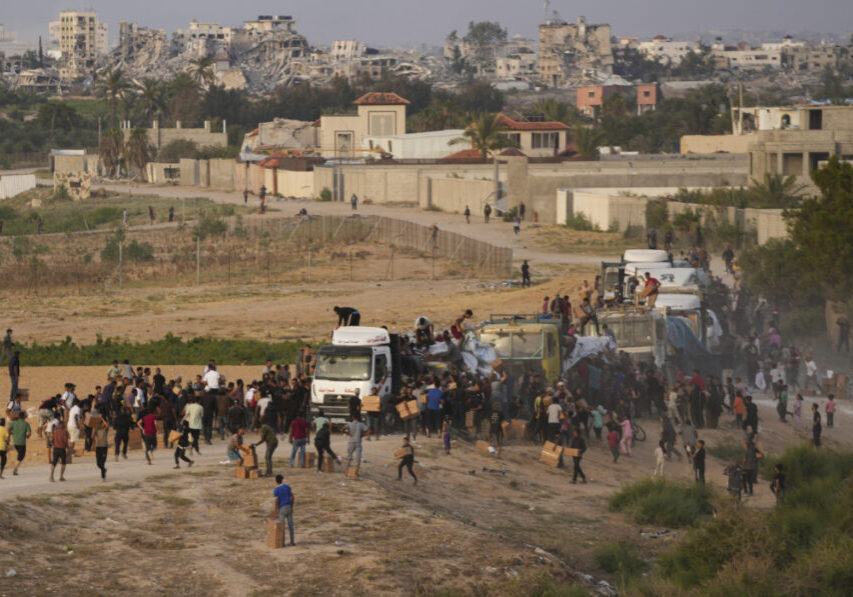Australia/Israel Review
Noted and Quoted – May 2023
May 2, 2023 | AIJAC staff

Playing with Fire
ABC and SBS ran TV and online reports that contained baseless claims accusing Israeli police of arbitrarily restricting the number of worshippers allowed to enter the Church of the Holy Sepulchre in Jerusalem for the annual Holy Fire ceremony on April 15, and using excessive force against visitors angry at being denied entry.
A joint ABC/AP article on the ABC website (April 13) implied that Israeli authorities had imposed the limit on their own initiative, and also aired an outrageous comparison – asserting that Jews did not experience similar restrictions on visits to the Western Wall during Passover. This omits the obvious reality that the Western Wall is a large sprawling outdoor prayer space with multiple exits, and nothing in common with the confined, narrow spaces of the Church of the Holy Sepulchre, which has only one exit.
An AP report on the ABC website (April 16) did provide more context, including that overcrowding at the Church of the Holy Sepulchre had led to catastrophe in the past.
A report by the BBC’s Yolande Knell on ABC TV “News at Noon Weekend” and SBS TV “World News” (April 16) repeated the accusations of unfair restrictions and claimed that a few recent incidents of attacks on Christians, which were widely condemned in Israel, were evidence of a Jewish plot to pressure Christians to leave the city.
What all the reports about the Holy Fire controversy omitted to mention was that the Church’s own staff architect Teo Metropoulos had formally written to Israeli police on April 3 asking for a limit on the numbers of worshippers allowed in for the ceremony to protect their safety.
The letter warned that, given the narrow exit to the Church, a limit of 1,800 visitors inside the building and 200 in an outdoor courtyard must be enforced. After consultations, Israeli police actually allowed more worshippers in than this.
As for allegations that Israeli police used excessive force, video footage showed that a few people tried to bypass the safety gates, sometimes forcefully, and were simply prevented from doing so.
Attribution and retribution
Allegations that Palestinian terrorism against Israel can be attributed to the inclusion of far-right ministers in the Israeli Government were raised in media coverage.
On ABC Radio National “Breakfast” (April 10), Israeli research associate Ayala Panievsky said rocket fire from Lebanon, Syria and Gaza was a result of “the establishment of the most far-right government in the history of Israel,” pointing to Itamar Ben-Gvir’s role as police minister which “caused many policies that were seen by Palestinians in Israel, in the West Bank, in Gaza… as… kind of encouraging hostile forces to act.”
On SBS TV “World News” (April 7), Australian Israeli reporter Irris Makler explained that the overlap between the holy Muslim month of Ramadan and the Jewish festival of Passover was “the source of the friction.”
Makler added that “it was exactly this set of circumstances, clashes at al-Aqsa during Ramadan, which coincided with Passover two years ago… that preceded the war with Hamas in Gaza.”
True – and notably, the 2021 violence occurred under a Netanyahu-led caretaker government that didn’t include Ben-Gvir.
Historical perspective
Against the backdrop of Israeli protests over judicial reform, veteran commentator Gerald Steinberg delved into the history of Israel’s legal system on ABC Radio “Nightlife” (March 30).
Professor Steinberg explained, “there was never a national debate about what should be the role” of the judiciary in Israel. The selection process for High Court judges was established in 1953 “without any serious public discussion,” he said.
Despite widespread popular protests, a consensus exists among Israeli parliamentarians – not just in the current Government – that the judiciary has accrued too much power, Steinberg added.
The massive protests, he suggested, stemmed from the Government introducing a package of reform “in a very blind way” that “was interpreted as an attempt to gain autocratic or, as the demonstrators said, dictatorial powers” and “risked entirely sweep[ing] away the checks and balances.”
Viewpoints
In the Spectator Australia (April 1), columnist Charles Moore opined that “the current crisis in Israel is poorly explained. Binyamin Netanyahu’s opponents are described as ‘pro-democracy protestors’, but in fact they oppose judges being chosen by MPs rather than by other judges. (They may be right here, but democratic they are not.) The real source of the trouble is the electoral system which empowers tiny extreme parties in coalition-building.”
Meanwhile, in the Australian Financial Review (March 28), the Washington Post’s Steve Hendrix attributed part of the backlash to Netanyahu “not campaign[ing] on overhauling the courts before the November election [and]… not mention[ing] judicial changes in his inaugural address.”
Going to Extremes
More extreme opinions on the reform controversy appeared on ABC Radio National “Late Night Live” (March 29), where US anti-Zionist activist Richard Silverstein accused the Israeli Government of wanting to “overthrow democracy”. Silverstein claimed “the reason… this is happening is that Israel has had a right-wing government basically for the past 50 years with a couple of intermissions for other governments that were not right-wing. But this Government is in a total category unto itself.”
In fact, most Israeli governments of the past 25 years have comprised coalitions of centrist and centre-right parties.
Meanwhile, in the Guardian Australia (March 31), Joshua Leifer criticised the protests on the basis that “the occupation” of the West Bank “is precisely what many of the protesters – who draped themselves in Israeli flags, who took to the streets in their military caps and berets… don’t want to talk about.”
He said protesters may chant “democracy” but are blind to the fact Israel is a “liberal ethnocracy that has maintained a military dictatorship in the West Bank for more than half a century.” Leifer ignored the efforts of successive Israeli leaders, including Netanyahu, to end the occupation through negotiations on a two-state resolution that were foiled by the rejectionist stance of Palestinian leaders, as well as the fact that most Palestinians live under the rule of their own elected leaders.
A Gallant backflip
Opinions varied on the value of Binyamin Netanyahu’s March 28 concession to pause the judicial reform agenda after massive street protests erupted following his decision to sack Defence Minister Yoav Gallant after the latter publicly warned Israel’s security was being endangered by “the growing rift” in society that is “penetrating the IDF”.
On ABC Radio “Breakfast” (March 28), Professor Gerald Steinberg said, “[Netanyahu’s] talking about negotiations. Part of the problem, though, is that we’ve heard this before [when] he’s been in trouble… then when he gets back into power, it seems as if those pledges have disappeared completely… there’s going to be a lot of distrust.”
On ABC Radio “AM” (March 29), Israeli academic Menachem Klein, predicted the pause was Netanyahu “just buying time, trying to divide the protesters.”
The Australian (March 29) said large-scale protests disprove “claims Israel’s estimable democracy is under threat… recent weeks have shown it is alive and well” but now “there is an urgent need for all sides… to seek the sensible middle ground.”
The Guardian Australia (March 30), said Netanyahu’s decision to pause the reform process was not because of an unwillingness “to tear the nation in half,” but all about “saving… himself”.
After Netanyahu reinstated Gallant, AIJAC Research Associate Dr Ran Porat said on ABC Radio “World Today” (April 11), “It was not a surprise because Netanyahu was flirting with reversing his decision for weeks now and… looking for a ladder to just climb down after he climbed too high … He doesn’t want to pay the political price of moving forward with that reform as it is.”
A Deterrent Effect
In the Australian (April 1), former Australian Ambassador to Israel Dave Sharma canvassed the effect months of protests have had on regional perceptions of Israel’s deterrence capacity.
Sharma wrote, “While Netanyahu was preoccupied with judicial reform, Saudi Arabia restored diplomatic relations with Iran in a deal facilitated by China. The coalition within the Middle East opposed to Iran’s expansionism, carefully cultivated and nurtured by Israel, is threatening to come apart.”
The “expansionist and anti-Palestinian agenda of Israel’s new government is causing disquiet” among the Abraham Accords signatories, including the UAE, Bahrain and Morocco, leading to Netanyahu’s invitation to visit Abu Dhabi repeatedly getting postponed, he wrote.
Tom’s Trash talk
An online article from ABC Middle East correspondent Tom Joyner (April 2) on the protests included a long section at the end that trashed Israel’s democratic credentials when compared to Australia.
According to Joyner, “although they share some similarities, Israel’s democracy differs widely from Australia’s… Israel oversees a brutal, decades-long military occupation over millions of Palestinians in the West Bank and effectively blockades the Gaza strip. Those Palestinians living under Israeli rule in the West Bank share none of the democratic rights enjoyed by citizens of Israel.”
Calling Israel’s occupation “brutal” is unsubstantiated opinion, ignoring the basic reality that Israel is effectively at war with numerous armed Palestinian groups.
Stating that Israel oversees a military occupation over millions of Palestinians and segueing into “those Palestinians living under Israeli rule in the West Bank share none of the democratic rights enjoyed by citizens of Israel” without any context or qualification for either statement is misleading.
The overwhelming majority of the millions of Palestinians on the West Bank live under the Palestinian Authority and are ruled by their own leaders. Palestinians living under direct Israeli rule in the West Bank number in the tens of thousands but can vote in Palestinian Authority elections (when it deigns to hold them).
Joyner’s decision to cite Israel’s partial blockade of Gaza as a point of difference between Israeli and Australian democracy, is not only opinion, but a non-sequitur. Blockades of enemy territory are not illegal under international law and say nothing about a country’s democratic credentials.
Joyner also didn’t feel it necessary to include an Israeli counter perspective, relying solely on Palestinian expert Dr Ghassan Khatib, a lecturer in “the occupied West Bank, and a former Palestinian politician” to back up the report’s blanket claim that “Palestinians view the Israeli courts as a key instrument for their oppression.”
Khatib was quoted saying, “ The Israeli judicial system has been a tool employed by Israel to appropriate land illegally, to deprive Palestinians of their rights, to discriminate against Palestinians inside Israel.”
In fact, Palestinian groups frequently petition the Israeli Supreme Court, which does issue significant findings in their favour – for example, in 2020 striking down legislation that retrospectively legalised settler homes built on private Palestinian land.
Indeed, the next day on ABC TV “The World”, Joyner’s report on proposed judicial reforms effectively undermined the article’s aspersions about the Israeli Supreme Court as a tool of Palestinian oppression. Joyner said, “In the Israeli occupied West Bank, Palestinians are worried if the Government’s plans become a reality, their rights and protections will be under even greater threat” – thus effectively conceding the Court does play a role in protecting Palestinian rights.
Own goals
The Australian media showed little sympathy for Indonesian politicians after FIFA stripped the world’s largest Muslim-majority nation of the right to host the Under-20 World Cup soccer tournament, following an announcement by Bali’s Governor that he would not let Israel’s qualifying team play because the two countries do not have diplomatic relations.
The Australian Financial Review’s Liam Gammon explained the machinations that resulted in Indonesia losing the tournament (April 11). Gammon said, “Mainstream Islamic organisations close to the administration, and even the Palestinian ambassador to Indonesia, were supportive of the long-planned tournament going ahead with Israel competing. What electrified the issue politically was objection to Israeli participation – on ostensibly anti-colonial grounds – from the nationalist PDI-P party to which President Widodo is affiliated. Party chairwoman and former President Megawati Sukarnoputri had quietly ordered local leaders from her party to oppose the Israeli team’s involvement.”
Earlier, ABC Southeast Asia correspondent Anne Barker said on ABC TV “Mornings” (March 28) the decision “only adds to the stain on Indonesia’s sporting reputation after last year’s soccer stadium tragedy at Malang, in which 135 people were killed in a stampede.”
On April 4, the Australian slammed Indonesia’s “self-destructive political posturing”, noting that in “2019, when it was awarded hosting rights, Jakarta gave a firm assurance about Israeli participation.”
The Australian reported (April 8) an Indonesian pollster saying that, before FIFA’s decision, support for Israeli participation was as high as 59% and likely higher after the loss of the hosting rights because people were “angry”.
Proxy Peril
On Sky News (April 10) AIJAC’s Dr Colin Rubenstein warned of Iran’s increasing regional profile in recent months.
Dr Rubenstein noted Iran’s material support for Russia’s war in Ukraine, the “de-escalation” agreement between Iran and Saudi Arabia brokered by China, and Teheran’s “encouragement of… its… proxies, particularly Hamas… Palestinian Islamic Jihad… Syria” to attack Israel.
The seriousness of Iran’s increased regional posturing had prompted the United States to “send… a submarine into the region,” he noted.
In the Guardian Australia (April 10), veteran Middle East correspondent Martin Chulov quoted an unnamed Israeli official saying of the Saudi-Iran rapprochement that, “There’s something in it for the Saudis that we have yet to figure out,” and of unexpected efforts by Sunni Arab countries to re-engage with Syria’s Bashar al-Assad that, “We’re not entirely sure what’s going on.”
Earlier, the Australian (March 31) said it was “imperative the US re-engages far more actively in the Middle East. Failing to do so will open the way for China to gain even further influence.”
Deadly tally
On April 11, the Canberra Times and SBS TV “World News” reported on the growing number of Israeli and Palestinian fatalities in 2023.
The list compiled by Associated Press said “more than 90 Palestinians have been killed by Israeli fire… at least half… affiliated with militant groups,” while “19 Israelis” have been killed during Palestinian attacks.
The Canberra Times included the important point, not made by SBS, that “all but one [of the Israelis] were civilians.”
The Guardian Australia’s list of fatalities (April 11) said that “at least 93 Palestinians of whom about half are militants and half civilians” were killed since January.
The critical point missing in all three news reports was the fact that the overwhelming majority of the so-called Palestinian “civilians” killed were actually involved in violent protests at the time, most either throwing rocks or Molotov cocktails. Only a few cases involved completely uninvolved civilians inadvertently killed.
Driverless vehicle
The ABC repeatedly covered a terrorist attack in a way that suggested no one was behind the wheel of a car that was deliberately driven into a group of people on Tel Aviv’s promenade, killing a 35-year-old Italian tourist and injuring several others.
Examples included ABC TV “News at Noon Weekend” (April 8), where newsreader Miriam Corowa introduced a BBC story from Lucy Williamson by saying “One person has been killed and several others wounded in a car ramming attack in central Tel Aviv.”
Williamson similarly said, “At least one man is reported to have died when a car rammed into people in the city centre.”
On April 10, ABC TV “Mornings” host Joe O’Brien introduced a third Williamson report about the funerals of Israeli sisters Maia and Rina Dee who were brutally murdered in a terrorist shooting attack along with their mother, by saying that “it happened on the same day as a car rammed a group of tourists in Tel Aviv.”
Later that day, Sky News’ Chris Kenny, on his eponymous program, criticised ABC TV “Mornings” saying, “A car rammed a group of tourists. Really? This stuff is as absurd as it is obscene. The car, of course was driven by… a murderous person. A terrorist.”
In Parliament
Prime Minister Anthony Albanese (ALP, Grayndler) Yom Ha’atzmaut greeting – April 24 – “At Yom Ha’atzmaut, Australia affirms its unwavering support for Israel and the Israeli people.”
PM Albanese Pesach greeting – April 4 – “Passover is always a powerful inspiration and a reminder of the courage, strength and resilience of the Jewish people… I wish Jewish Australians, a happy Passover.”
Opposition Leader Peter Dutton (Lib., Dickson) Pesach greeting – April 4 – “To our wonderful Jewish community who have contributed so much across our nation in many fields of endeavour, we thank you. I wish you all a happy Passover.”
Foreign Minister Senator Penny Wong (ALP, SA) Statement – April 9 – “Australia condemns unreservedly the indiscriminate rocket attacks… and recognises Israel’s right to defend itself. We are shocked by the horrifying news of deadly terror attacks… Terrorism and violence against civilians can never be justified… Violence at Al Aqsa, including against worshippers, is reprehensible. Security operations must be proportionate and in accordance with international law.”
Shadow Minister for Employment and Workplace Relations Senator Michaelia Cash (Lib., WA) – March 23 – “The Coalition is proud to introduce this Bill which amends the Criminal Code Act of 1995 to prohibit the display of Nazi symbols… Since the rise of the Nazi Party… Nazi symbols have been synonymous with antisemitic thoughts and actions, including the devastation of the Holocaust.”
Shadow Foreign Minister Senator Simon Birmingham (Lib., SA) moving to allow the bill to be debated immediately – March 24 – “We must continue to stand as one against an ideology that is most associated with acts of genocide, mass murder and other forms of persecution… The horrors of the Holocaust must never be forgotten.”
Minister for the Public Service, Finance and Women Senator Katy Gallagher (ALP, ACT) – March 24 – “The Government does not support… to bring forward a bill that was introduced this week… the Government has been working on matters relating to the prohibition of Nazi symbols for some time.”
Assistant Minister for Education and Regional Development Senator Anthony Chisolm (ALP, Qld) – March 24 – “… there is no place in this country for public displays of Nazi symbols or the Nazi salute.”
Shadow Minister for Health and Aged Care and Sport Senator Anne Ruston (Lib., SA) – March 24 – “There is absolutely no place in Australia, in our community—there should be no place in the world—for Nazi symbols… they are directly linked to the worst crimes committed against humanity in any of our living history.”
Shadow Home Affairs Minister Karen Andrews (Lib., McPherson) – March 20 – “I move: That this House… calls on the Government to urgently take the necessary steps to formally categorise the Islamic Revolutionary Guard Corps [(IRGC)] as an organisation involved in supporting and facilitating terrorism.”
Julian Hill (ALP, Bruce) – March 20 – “… the [IRGC] is a malignant actor. They’re a threat to the Iranian people and to peace in the region and… the world.”
Andrew Wallace (Lib., Fisher) – March 20 – “‘The Revolutionary Guards is an institution under the Leader’s supreme command’… This is the same Supreme Leader who has pledged to annihilate the State of Israel, who denies the Holocaust… Here we have a primary branch of the nation’s armed forces perpetrating terror.”
Luke Gosling (ALP, Solomon) – March 20 – “The IRGC is a malignant actor that has long been a threat to international security and to its own people.”
Aaron Violi (Lib., Casey) – March 20 – “The [Iranian] regime is effectively a rogue state responsible for acts of terrorism, cybercrime, acts of violence against its critics, hostage diplomacy and other abhorrent behaviour.”
Tags: Australia, Media/ Academia






